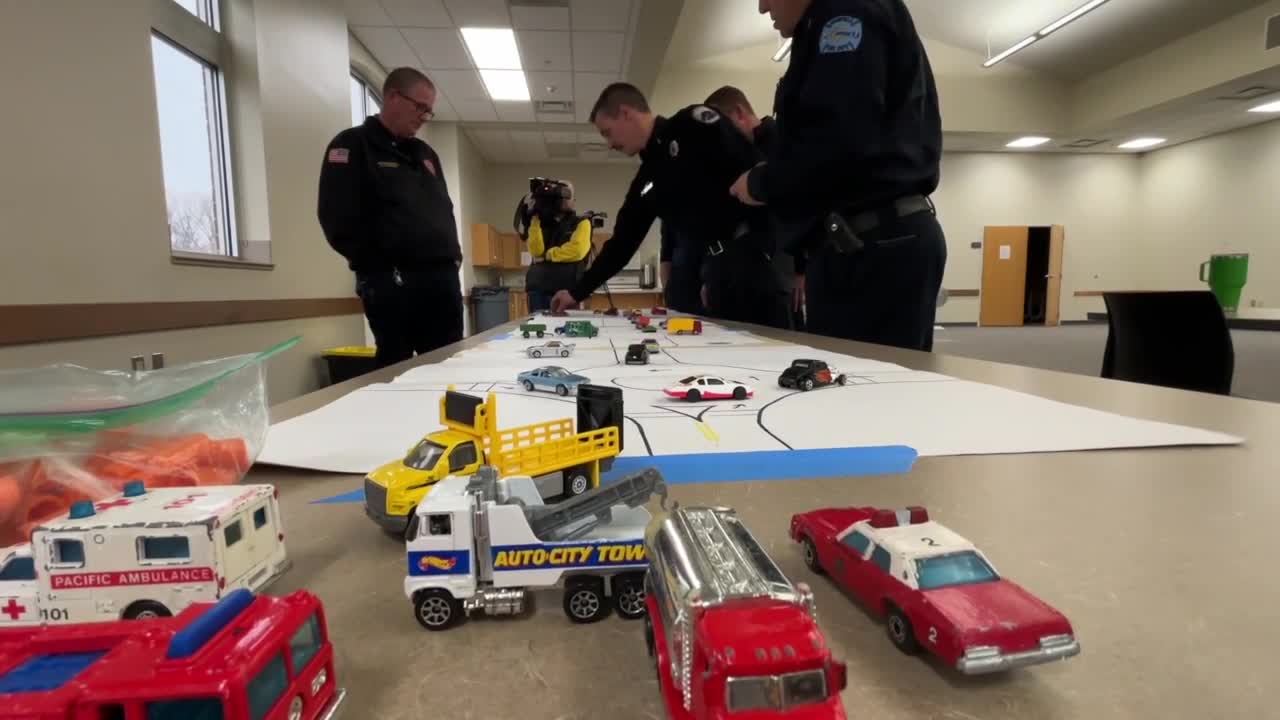WALKER, Mich. — At first glance, it might look like child's play: grown firefighters gathered around a table covered with Hot Wheels cars and tiny emergency vehicles.
But don't be fooled by the toy factor. This training could save lives — both for first responders and the people they're sworn to protect.
"Road incidents, especially on the highway, are actually our most dangerous calls, both to us and the general public," said Payton Daetwiler, a firefighter and EMT with the Walker Fire Department. "Even though it looks a little silly with Hot Wheels ... it's actually really good to go over strategies."
Daetwiler, who's been with the department just nine months, joined fellow firefighters Thursday for specialized training in traffic incident management. The course uses miniature emergency vehicles to teach proper positioning at crash scenes — techniques that could mean the difference between life and death on Michigan's busy roads.
The scaled-down approach gives responders what Daetwiler calls "almost like a God's view of things," helping them understand not just where to position their trucks, but why those decisions matter.
Ron Tennant, Rockford's fire chief and a longtime advocate for traffic incident management, led the training session. He says he has seen too many close calls — and worse — on Michigan roads.
"Currently in the United States, as of two days ago, we've lost 31 responders to roadway incidents," Tennant said. "That's unacceptable, even though it's lower than it has been in years past."
The statistics hit close to home. Michigan lost a State Police trooper to a road incident just over a year ago. For Tennant, the goal is simple: "Those numbers need to be zero."
The training, part of a national program available since 2012, brings together firefighters with varying experience levels — from veterans with years on the job to relative newcomers like Daetwiler. The common thread? Most responders haven't received formal training on roadway safety, despite responding to highway incidents regularly.
"This is a subject matter that we don't often cover in our studies, and we really should be, because we're in the roadway just about every time we respond to an incident," Tennant noted.
For Daetwiler, originally from Juneau, Alaska, who moved to Grand Rapids and joined the fire service with "a higher calling" to help people, the training reinforces a fundamental truth about emergency work.
"Training is definitely the most important thing we do, especially if it's something that we don't see a lot, you have to train a lot for it to make up for that," he said. "You never want someone to come during an emergency situation, and they haven't trained on it."
"It's a few extra minutes of inconvenience," Tennant said. "But in the end, if something happens, it's up to a lifetime of impact and sorrow."
For emergency responders like Daetwiler, every training session is preparation for the worst-case scenario — and a chance to come home safe at the end of the shift.
Companies or agencies interested in traffic incident management training can find more information by searching "Michigan Traffic Incident Management" online.
This story was initially reported by a journalist and has been converted to this platform with the assistance of AI. Our editorial team verifies all reporting on all platforms for fairness and accuracy.





